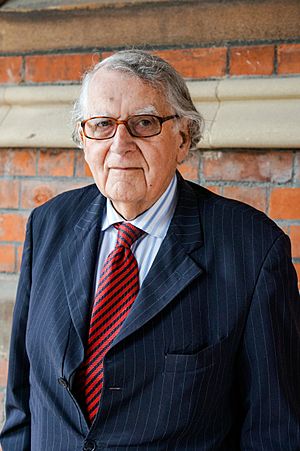Maurice Hayes facts for kids
Quick facts for kids
Maurice Hayes
|
|
|---|---|
 |
|
| Senator | |
| In office September 1997 – July 2007 |
|
| Constituency | Nominated by the Taoiseach |
| Personal details | |
| Born | 8 July 1927 Killough, County Down, Northern Ireland |
| Died | 23 December 2017 (aged 90) Downpatrick, County Down, Northern Ireland |
| Political party | Independent |
| Spouse | Johanna |
| Children | 5 |
| Alma mater | Queen's University Belfast |
| Profession | |
Maurice Hayes (born 8 July 1927, died 23 December 2017) was an important person in Ireland. He worked as a public servant, which means he helped run government services. Later in his life, he became a senator in the Seanad Éireann, which is like one of the houses of parliament in Ireland.
He was chosen by the Taoiseach (the Prime Minister of Ireland), Bertie Ahern, to be a senator in 1997 and again in 2002. Maurice Hayes also led the National Forum on Europe, helping people in Ireland understand important European topics. In 2003, he was even named European Person of the Year!
Contents
Early Life and Education
Maurice Hayes was born in 1927 in Killough, a small place in County Down, Northern Ireland. He went to Queen's University Belfast and earned a special degree called a PhD in English.
After his studies, he taught at St Patrick's Grammar School in Downpatrick. Later, he became the town clerk of Downpatrick, following in his father's footsteps. This job meant he helped manage the town's daily activities.
Working for the Public
Maurice Hayes was known for being fair and balanced, especially in the often-difficult politics of Northern Ireland. He helped write important reports that looked at how things could be improved.
One famous report he worked on was for the Patten Commission. This group looked at how to make changes to the police force in Northern Ireland, which was then called the Royal Ulster Constabulary (RUC). It was later renamed the Police Service of Northern Ireland (PSNI).
Writing and Books
Maurice Hayes was also a talented writer. He wrote many articles for newspapers, especially the Irish Independent.
He wrote three books about his own life and experiences:
- Sweet Killough: Let Go Your Anchor
- Black Puddings with Slim: A Downpatrick Boyhood
- Minority Verdict: Experiences Of A Catholic Civil Servant
He also wrote or helped edit other books about solving conflicts, improving community relations, and Irish writing.
Important Roles and Groups
Maurice Hayes held many important positions throughout his life. He was the Northern Ireland Ombudsman, which means he helped people if they had complaints about government services. He also worked as a Boundary Commissioner and was a top official in the Department of Health and Social Services.
He led the Community Relations Council, which works to improve relationships between different groups of people. He also chaired the Acute Hospitals Review Group, looking at how hospitals could work better.
Maurice Hayes was the chairman of The Ireland Funds in the Republic of Ireland. This is a large charity that raises money around the world to help solve social and business problems in Ireland.
He was also a long-serving director at Independent News & Media Plc, a big media company. He retired from this role in 2009.
Maurice Hayes was asked by the Taoiseach, Bertie Ahern, to be a senator in 1997 and again in 2002. He also led the National Forum on Europe. He came up with a great way to teach people about European issues, and other countries even started using his methods!
In his later years, he was a member of the Royal Irish Academy, a group of top experts in Ireland. He also served on a committee at Queen's University Belfast medical school and was a governor of the Linen Hall Library, a famous library in Belfast. He was a long-time member of the Scholarship Board of the O'Reilly Foundation, which helps students.
He was also asked by Mary Harney, who was the Minister for Health, and the HSE to look into a problem at Tallaght Hospital near Dublin.
Sports and Personal Life
Maurice Hayes was a talented hurler, which is a traditional Irish sport. In the mid-1950s, he became the County Secretary for the Down Gaelic Athletic Association (GAA). He created a ten-year plan for the Down county football team to win the All-Ireland Senior Football Championship, a huge national competition.
His plan worked! Within five years, Down won their first All-Ireland trophy in 1960. They won again in 1961, 1968, 1991, and 1994. Down was the first team from Northern Ireland to win this championship. No other Northern team won an All-Ireland title until Derry won in 1993.
Maurice Hayes passed away in Downe Hospital on 23 December 2017, at the age of 90, after a long illness.
Awards and Honours
As mentioned, Maurice Hayes was voted European Person of the Year in 2003, which was a great honour.
He also received special honorary doctorates from several universities, including:
- His own university, Queen's University Belfast
- University of Ulster in the UK
- Trinity College, University of Dublin
- National University of Ireland
These awards showed how much his work and contributions were valued.
 | Ernest Everett Just |
 | Mary Jackson |
 | Emmett Chappelle |
 | Marie Maynard Daly |

